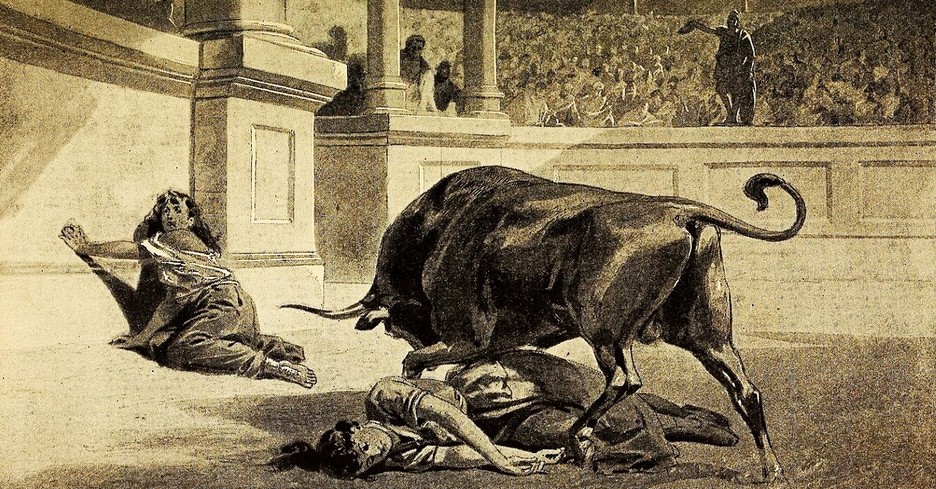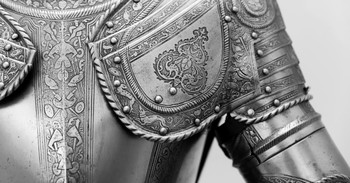
A young woman named Perpetua stood firm in her faith in the year AD 203 in Carthage, North Africa. Because she kept a diary, we know much about her ordeal. This story is based on her diary.
"I Am a Christian"
It was simple, really. All I had to do to get out of prison was to offer a small sacrifice of incense to the pagan gods. Just a pinch of incense to honor the emperor Septimus and I would walk free. My father insisted that something this small should be easy for me to do. Why was I being so stubborn?
"Father, do you see this pitcher?" I asked as I pointed to the water pitcher on the table.
"I see it," he replied.
"Can it become a dog?"
"Of course not!" he exclaimed, looking at me as if my arrest had scrambled my brains. "It is a pitcher!"
"You're right. It cannot become something it is not, and it is ridiculous for me to call it something else. So it is with me, Father. I am a Christian and cannot be called anything other than what I am. A Christian."
At this, my father's temper rose and he stormed from the prison cell in a fury. Once again, my convictions just didn't make sense to him.
Obedience
Deep anguish pierced my heart as I sank down to the hard stone floor. How could I cause my dear father so much pain? I thought of how well he treated me over the years. Beautiful robes of the finest silk, expensive jewels to adorn my hair, and the choicest delicacies were all mine. My well-to-do father would spare no expense when it came to his only daughter.
Of course, Father expected obedience in return. All good Roman girls were taught to obey, and I was no exception. Disobedience simply wasn't an option. I had been taught to be loyal at all costs, and until now I had always done what was expected. It was easy to do since I adored him so. But now my heart ached, for I had no choice but to go against my father's command.
You see, my loyalty to my father was very strong, but even stronger was my loyalty to my Lord and Savior. I had recently learned that Jesus died for my sins, and I had committed my life fully to Him. Love for Jesus filled my soul, and joy filled my heart. It wasn't long, however, before the authorities learned of my faith. They came in the evening and pulled me and my servant girl, Felicitas, also a Christian, out into the street. We were paraded in shame down the streets of Carthage to the prison.
Dungeon or Palace?
"Felicitas! Come sit here on this bit of straw and rest for a while," I said.
"Oh, Lady Perpetua! It's so odd for you to be fussing over me!"
"Felicitas, please don't call me that anymore! In Christ we are all equal. You are no longer my slave, but rather you are my sister and dear friend! Come now, you must get plenty of rest for the sake of your unborn baby."
The dark dungeon prison was a far cry from my comfortable Roman-style home. The heat and stench were nearly unbearable. Hunger overtook my body, but God sustained me and the other prisoners who were Christians. We cried out to God for relief, and took great comfort in prayer and song and in speaking God's Word. God even gave us visions and dreams that encouraged us in our journey. True relief came my way one special day.
The day they allowed my infant son to come and stay with me, I felt the prison had suddenly become like a palace! I no longer minded the horrible smell or the oppressive heat -- I had my sweet little baby to hold and to care for. I fed him and held him and sang to him our songs of faith. Night and day I prayed for him, trusting God for his future.
My case was before the Roman official, Hilarion, and my father had returned. His tears dropped on my hand as he begged me to abandon my Christian beliefs. "If you won't do it for me, then consider your infant son! Surely you don't intend to leave him behind for the sake of this new god you have found."
My stomach wrenched in pain as I thought of my family and my own sweet son. But no matter what, I could not dishonor my Savior. I tried to comfort my father. "Whatever God wants to happen to me will happen. My strength doesn't come from myself, it comes from God."
Finally, the sentence was handed down. I was condemned to the arena and the wild beasts. I would be called upon to give my life for Jesus, just as He gave His life for me. I knew He would strengthen me for what I must do.
The other Christians were also sentenced to death. We praised God when Felicitas' baby was born healthy and adopted by another believer. God also provided for my baby to be cared for by my family.
In our final days together, we prayed, sang and encouraged one another. We even celebrated the Lord's Supper on our last evening. God gave us the strength we needed to stand firm in our beliefs. We rejoiced knowing that our struggle would soon be over and we would be together in the presence of our Savior!
That's as far as Perpetua's writing takes us. Other Christians added the rest of the story.
Into the Arena
When the believers entered the arena on the day of their victory, their faces reflected great joy! They had finally begun their journey from the dark prison to the light of God's presence.
The crowd became very angry, demanding that the gladiators whip those who were to die. Instead of becoming angry, the prisoners rejoiced that they were able to share in the sufferings of Jesus.
A mad cow was set loose upon Perpetua and Felicitas. Perpetua was thrown to the ground first and then the cow charged toward Felicitas. Though her gown was torn, Perpetua was not hurt. She covered herself with her torn garment and pinned her hair back up. It seemed she wanted to look her best as she prepared to meet her Savior. The two friends embraced, awaiting the end.
As the crowd demanded to see their death, Perpetua looked into the eyes of the gladiator who was to take her life. His hands trembled so badly he could barely hold his sword. Perpetua reached out and slowly guided the sword for him. As she whispered the name of our Savior, she left this world and entered into the everlasting happiness of God's presence.
Make It Real! Questions to make you dig a little deeper and think a little harder.
1. Why did Perpetua refuse to offer the incense to the pagan gods? What would you have done?
2. In order to obey God, Perpetua felt she had to disobey her father. Was this a good choice? Why or why not?
3. Pagans worshipped idols. Exodus 32 tells how even the Israelites made a golden calf idol while Moses was on Mount Sinai getting the Ten Commandments from God. What did they do with it? What was God's reaction?
4. Are there idols or false gods that people worship in place of God today?
5. Why do you think Perpetua's story is still being told almost 2,000 years later?
Photo Credit: Public Domain (1907 illustration via Wikimedia Commons)
This article is part of our People of Christianity catalog that features the stories, meaning, and significance of well-known people from the Bible and history. Here are some of the most popular articles for knowing important figures in Christianity:
How Did the Apostle Paul Die?
Who are the Nicolaitans in Revelation?
Who Was Deborah in the Bible?
Who Was Moses in the Bible?
King Solomon's Story in the Bible
Who Was Lot's Wife in the Bible?
Who Was Jezebel in the Bible?
Who Was the Prodigal Son?


